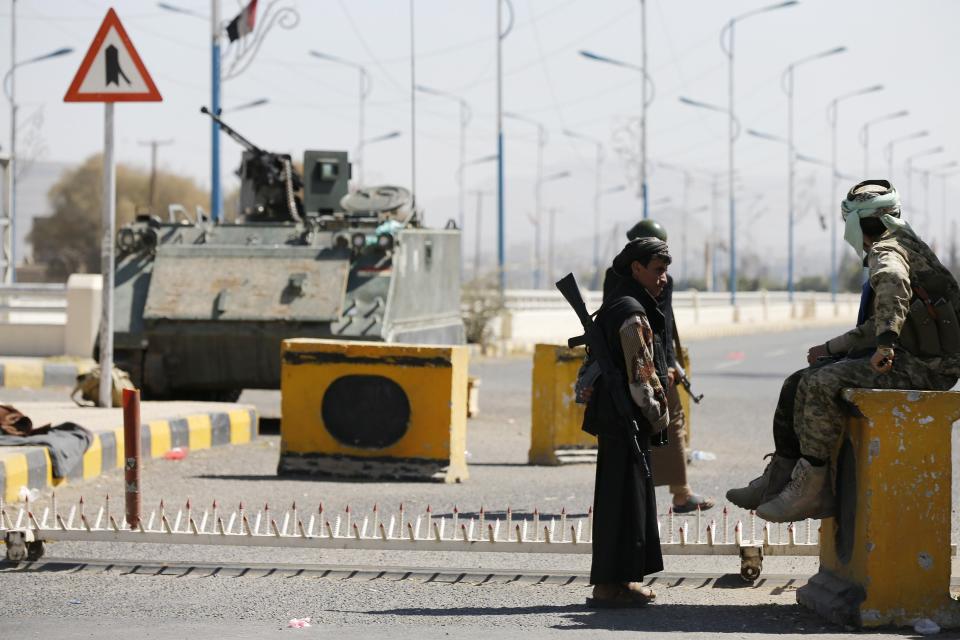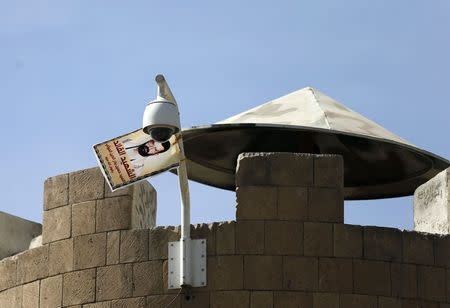Houthis welcome Yemeni president's concessions but gunmen remain
By Yara Bayoumy and Mohammed Ghobari SANAA (Reuters) - Yemen's Houthi rebels welcomed on Thursday proposed concessions by the government on power-sharing but their gunmen still held positions outside the residence of President Abd-Rabbu Mansour Hadi, who remains a virtual prisoner there. Hadi, an ally of the United States, said on Wednesday he was ready to accept Houthi demands, easing a standoff linked to regional tensions between Iran and Saudi Arabia and which has also complicated the global fight against al Qaeda. His concessions appeared to yield to pressure from the Shi'ite group, whose fighters battled their way into the presidential palace this week after seizing an aide to Hadi. The Houthis' defeat of the presidential guards added to disarray in a country where the United States is also carrying out drone strikes against one of the most powerful branches of al Qaeda. In Washington, U.S. State Department spokeswoman Jen Psaki welcomed Hadi's announcement but said the situation in Yemen remained volatile. "It's a good step but implementation is key and we're going to have to see what happens over the next hours and days," she said on CNN. Psaki said no decision had been made to evacuate staff from the U.S. Embassy in Sanaa. Staff safety was paramount, she added, but the United States was still working on counter-terrorism operations in Yemen. A Houthi politburo member said Hadi's concessions were in line with a peace deal which his group, whose official name is Ansarullah, signed with other political parties when they seized the capital Sanaa in September - a move that helped to cement the rebels' position as Yemen's de facto powerbrokers. "The latest agreement is a series of timed measures to implement the peace and partnership accord, which shows that Ansarullah were not planning to undermine the political process," politburo member Mohammed al-Bukhaiti told Reuters. "The agreement is satisfactory because it confirms what is most important in the partnership agreement," he said. The withdrawal of the gunmen, and the release of presidential aide Ahmed Awad bin Mubarak could happen in the next three days if the authorities committed to implementing the agreement fully, al-Bukhaiti added. REGIONAL STRUGGLE The rebels' rise has resulted in a shift in Yemen's complex tribal, religious and regional allegiances. In addition, they are players in the regional struggle between neighbouring Saudi Arabia and Shi'ite Iran. Suspecting Iranian complicity, the Sunni Muslim authorities in Riyadh cut most of their financial aid to Yemen after the Houthis' takeover of the capital. Hadi said he was ready to accept demands for constitutional change and power sharing with the Houthis. Conceding to a major demand, he confirmed in a statement that the draft constitution was subject to amendment and said all sides had agreed that government and state institutions, schools and universities should rapidly return to work. He also said the Houthis had agreed to leave his private residence and the presidential palace, and to free bin Mubarak, a former presidential nominee whom the Houthis seized on Saturday. But the capital remained largely shut down, witnesses said, even though the airport and seaport in the southern city of Aden resumed work on Thursday, having closed for a day in protest at the Houthi offensive against Hadi's administration. In central Yemen, local tribesmen said they were pushing back Houthi fighters in Marib province, which produces half of Yemen's oil and more than half of its electricity. STAYING PUT The Houthis' latest humiliation of Hadi could undermine the joint Yemen-U.S. strategy against al Qaeda. The local branch has responded to the Houthis' ascent by attacking their forces, as well as state, military and intelligence targets. It is not clear if a Houthi-dominated government would maintain such close ties with Washington. The movement has been virulently anti-U.S. in the past, but their leaders are also known for their pragmatism. As Zaidis, a Shi'ite Muslim sect, the Houthis oppose the hardline Sunni Islamists of al Qaeda. However, the Houthis' assaults on the militants risk raising sectarian feelings in predominantly Sunni Yemen. Clusters of Houthi fighters were dotted around the perimeter of the presidential palace on Thursday. At Hadi's residence, sentry points normally used by presidential guards were empty, and a group of Houthis with an army vehicle were parked at a main entrance. "The Houthis will not withdraw. They have agreed in the past to withdraw from Sanaa, but they did not," said Mohammed Said, a local resident standing close to Hadi's residence. Another Houthi official told Reuters he expected Hadi to announce a decision on government posts, after which the group would begin procedures for the release of bin Mubarak and the gradual withdrawal from the presidential buildings. But Yemen's Information Minister Nadia al-Saqqaf expressed scepticism. "Ahmed Mubarak is still (the) Houthis' hostage," she wrote on her Twitter account. "They got what they want. Why they should fulfil their promise?" A source close to the presidency said the Houthis have "gradually" begun to withdraw from Hadi's private residence. "Presidential security will be redeployed to their positions in the next two days," the source told Reuters. (Additional reporting by Mohammed Mokhashaf in Aden and Doina Chiacu in Washington; Writing by Sami Aboudi and Williamd Maclean; Editing by Raissa Kasolowsky and David Stamp)



